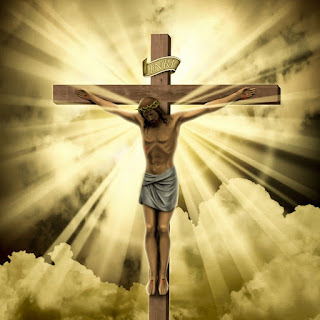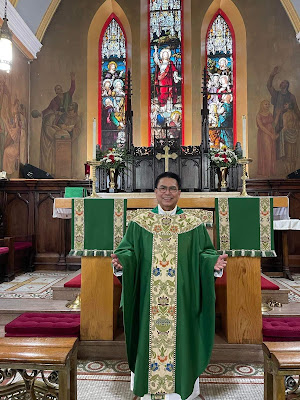THE CROSS OF LIBERATION BY FRED VERGARA
THE CROSS OF LIBERATION
The Rev. Dr. Fred Vergara, Holy Trinity Episcopal Church, 130 Jerusalem Avenue, Hicksville, New York. March 13, 2022
Some Pharisees came and said to Jesus, "Get away from here, for Herod wants to kill you." He said to them, "Go and tell that fox for me, 'Listen, I am casting out demons and performing cures today and tomorrow, and on the third day I finish my work.”(Luke 13:31-32)
We live in the tension of fragility and fluidity in this planet earth. Life is fleeting and unpredictable. Few months ago, much of the people in Ukraine were living in relative peace. Today, millions are gripped with fear and anxiety, uncertain of the future and fearing for their lives and the lives of their children.
With no fault of their own, the masses of its people, find themselves victims of Russian invasion. While their heroes struggle to defend their country and protect their democracy and sovereignty, the masses are caught in the vortex of War. Already, 2.5 million Ukrainian refugees are seeking shelter in their neighboring countries, a gargantuan humanitarian crisis, the humongous refugee problem since World War II.
How do we find comfort and strength in the midst of life’s uncertainty, in the world’s restless sea? Today, we get a glimpse of Jesus’ journey from transfiguration to glorification and the way of this journey is through His crucifixion. The Cross of Christ is the cross of Liberation from our fears, from our pride and from our entanglements in this world.
The Cross of Christ sets us free from the bondage of fear.
Jesus sets the contrast between His work and that of the Devil. Jesus said in John 10:10. “The thief comes only to kill, steal and destroy; I come that you may have life and have it abundantly.”
The sum of all our fears ultimately boils down to this one queen of fears, the fear of death. The fear of sickness, the fear of poverty, the fear of danger, the fear of adventure, the fear of being lonely, the fear of getting old all lead to this one fear, the fear of death.
So this became the summum bonum, the ultimate goal of Christian mission, to liberate us from the fear of death. In the Old Testament, in the fragile life of God’s people in the wilderness of Sinai, the venomous snakes were a fearful reality. The Hebrews miraculously survived the plagues of Egypt, been liberated from slavery but now they are fearing from their serpents. God told Moses to erect a bronze serpent and whoever was bitten would simply look up to the bronze serpent and they would be healed.
That bronze Serpent is now symbolized by the Cross of Jesus so that when we are fearful of life, we must look up to the Cross and be freed from the fear of death.
Second, the cross liberates us from pride.
The great Mahatma Gandhi, the father of India’s Independence from Great Britain popularized the concept of ahimsa or “non-violence.” Ahimsa is a Hindu and Buddhist ethical framework of “not inflicting any injury to any living creature.” India was successful in obtaining their independence without many loss of lives. This non-violence was also adapted by Martin Luther King, Jr. in the American struggle for civil rights.
In India’s caste system, Gandhi was a member of the Vaisya, the powerful merchant caste. But he humbled himself and advocate for the liberation of the Dalits, the outcasts. Instead of calling them “untouchables” as the mainstream Indian society called them, Gandhi called the Dalits as “Harijans,” or “Children of God.” In his Hindu spirituality, Gandhi integrated Christian teachings which he learned from his best friend and adviser, Anglican priest, Charles Andrews. According to Father Andrews, Gandhi’s favorite hymn was “When I surveyed the wondrous cross” particularly the words which says, “My richest gain, I count but loss and pour contempt on all my pride.” It is to be noted that of the people of India, it was the Dalits who first responded to the gospel when it was preached by the Apostle Thomas until he was martyred in Madras in 52 AD, 1970 years ago today.
The cross of Christ liberates us from worldly attachment.
St. Paul wrote to the Romans, the Gentile Christians who accepted Jesus Chris. “Join in imitating me (as I imitate Christ), and observe those who live according to the example you have in us. For many live as enemies of the cross of Christ; I have often told you of them, and now I tell you even with tears. Their end is destruction; their god is the belly; and their glory is in their shame; their minds are set on earthly things.”
Story is told of a man driving a
Lamborghini in a highway in California. It is one of the most expensive cars in
the world and certainly a social status symbol. As he was driving it, he opened
its window and extended his arm to feel its power and speed. Unfortunately,
another car sideswiped him and he lost his arm. He was able to stop and the
accident was reported. But as he was carried into the ambulance, he screamed,
“my Rolex, my Rolex! Please find my Rolex!” (He was more horrified of losing his Rolex watch than his arm!)
St. Paul looked with pity for those whose minds and hearts are so entangled with the things of this world that they could not see eternity, “because their minds are set on earthly things.”
But the cross of Christ liberates us the vanity of worldly pursuits, the temptations for greed for riches and lust for power that Jesus has nailed on the Cross. St Paul inspired the Romans to set their minds on the things that are above and not on the things that are below.
Abraham was richly and abundantly blessed by God but he did not settle in palaces but in tents because he was always and ever ready for God’s call. The Book of Hebrews called it faith, because he was looking for an eternal city of God, the city which has a strong foundation, whose builder and maker is God.
So we are simply pilgrims, temporary residents in this planet Earth, St. Paul said. “For our citizenship is in heaven, and it is from there that we are expecting a Savior, the Lord Jesus Christ. He will transform the body of our humiliation that it may be conformed to the body of his glory, by the power that also enables him to make all things subject to himself.”
The cross of Christ becomes our liberation from our captivity to the world. This enables us to live in love and peace with all people.
One of the benedictions we use in the Episcopal Church was the one based on the writings of Swiss philosopher, Henri Frederic Amiel (1821-1881)and is says: Life is short, and it And we do not have much time to gladden the hearts of those who make the journey with us. So be swift to love, and make haste to be kind. And the blessing of God, who made us, who loves us, and who travels with us be with you now and forever. Amen.




Comments
Post a Comment